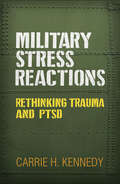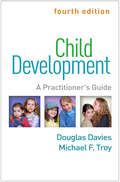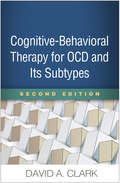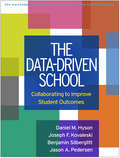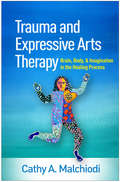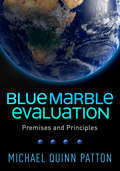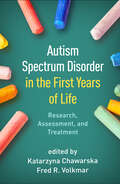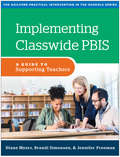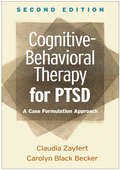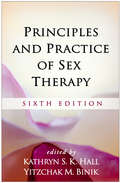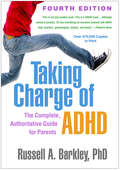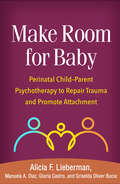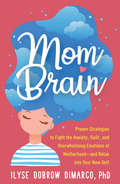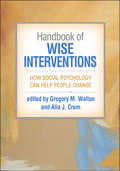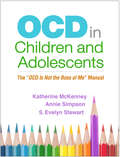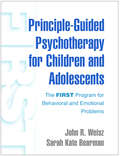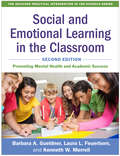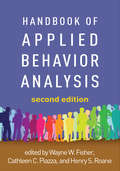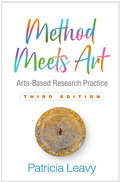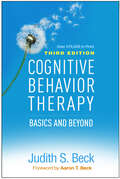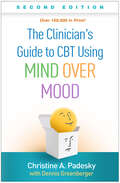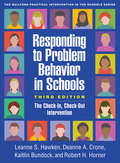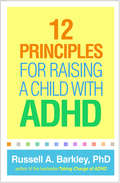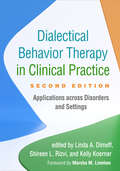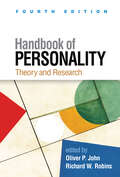- Table View
- List View
Military Stress Reactions: Rethinking Trauma and PTSD
by Carrie H. KennedyMany people--including some mental health professionals and service members themselves--have the misconception that military deployment is highly likely to cause posttraumatic stress disorder (PTSD). This book gives practitioners a more nuanced understanding of military stress reactions and related mental health concerns, from transient adjustment problems to clinical disorders. Drawing on expert knowledge of military environments and culture, Carrie H. Kennedy provides vital guidance for evidence-based assessment, intervention, and prevention. Kennedy emphasizes that overdependence on the diagnosis of PTSD can lead to suboptimal care, and shows how to tailor treatment to each service member's or veteran's needs. A crucial addition to any practitioner's library, the book is illustrated with numerous case vignettes.
Child Development, Fourth Edition: A Practitioner's Guide (Clinical Practice with Children, Adolescents, and Families)
by Douglas Davies Michael F. TroyNow in a revised and updated fourth edition, this trusted text and professional resource provides a developmental framework for clinical practice. The authors examine how children's trajectories are shaped by transactions among family relationships, brain development, and the social environment. Risk and resilience factors in each of these domains are highlighted. Covering infancy, toddlerhood, the preschool years, and middle childhood, the text explores how children of different ages typically behave, think, and relate to others. Developmentally informed approaches to assessment and intervention are illustrated by vivid case examples. Observation exercises and quick-reference summaries of each developmental stage facilitate learning. New to This Edition *Incorporates a decade's worth of advances in knowledge about attachment, neurodevelopment, developmental psychopathology, intervention science, and more. *Toddler, preschool, and school-age development are each covered in two succinct chapters rather than one, making the book more student friendly. *Updated throughout by new coauthor Michael F. Troy, while retaining Douglas Davies's conceptual lens and engaging style.
Cognitive-Behavioral Therapy for OCD and Its Subtypes, Second Edition
by David A. ClarkNow significantly revised with 80% new content, this authoritative guide synthesizes the latest knowledge on obsessive–compulsive disorder (OCD) and its treatment. Prominent clinician-researcher David A. Clark describes the "whats," "whys," and "how-tos" of CBT for a broad range of obsessions and compulsions. Combining scientific rigor and clinical acumen, the book illustrates an effective approach to assessment, case formulation, psychoeducation, and cognitive and behavioral intervention. It includes 26 reproducible forms and handouts; purchasers get access to a Web page where they can download and print the reproducible materials in a convenient 8 1/2" x 11" size. First edition title: Cognitive-Behavioral Therapy for OCD. New to This Edition *Reflects more than 15 years of major advances in clinical practice, theory, and research. *Chapters on specific OCD subtypes: contamination, doubt and repeated checking, repugnant obsessions, and symmetry/order. *Heightened clinical utility--includes more case vignettes and step-by-step procedures. *Describes important refinements to exposure and response prevention, based on inhibitory learning. *Reproducible materials now available online.
The Data-Driven School: Collaborating to Improve Student Outcomes (The Guilford Practical Intervention in the Schools Series)
by Daniel M. Hyson Joseph F. Kovaleski Benjamin Silberglitt PhD Jason A. PedersenThis indispensable practitioner's guide helps to build the capacity of school psychologists, administrators, and teachers to use data in collaborative decision making. It presents an applied, step-by-step approach for creating and running effective data teams within a problem-solving framework. The authors describe innovative ways to improve academic and behavioral outcomes at the individual, class, grade, school, and district levels. Applications of readily available technology tools are highlighted. In a large-size format with lay-flat binding for easy photocopying, the book includes learning activities and helpful reproducible forms. Purchasers can download and print the reproducible forms, as well as access Excel spreadsheets and PowerPoint slides related to the book, at the companion website. This book is in The Guilford Practical Intervention in the Schools Series, edited by Sandra M. Chafouleas.
Trauma and Expressive Arts Therapy: Brain, Body, and Imagination in the Healing Process
by Cathy A. MalchiodiFrom pioneering therapist Cathy A. Malchiodi, this book synthesizes the breadth of research on trauma and the brain and presents an innovative framework for treating trauma through the expressive arts. The volume describes powerful ways to tap into deeply felt bodily and sensory experiences as a foundation for safely exploring emotions, memories, and personal narratives. Rich clinical examples illustrate the use of movement, sound, play, art, and drama with children and adults. Malchiodi's approach not only enables survivors to express experiences that defy verbalization, but also helps them to transform and integrate the trauma, regain a sense of aliveness, and imagine a new future. Purchasers get access to a companion website where they can download and print reproducible tools from the book in a convenient 8 1/2" x 11" size, as well as full-color versions of 26 figures.
Blue Marble Evaluation: Premises and Principles
by Michael Quinn PattonAs a transdisciplinary profession, evaluation has much to offer to global change interventions that work toward a sustainable future across national boundaries, sectors, and issues. This book introduces Blue Marble evaluation, which provides a framework for developing, adapting, and evaluating major systems change initiatives involving complex networks of stakeholders. Michael Quinn Patton demonstrates how the four overarching principles and 12 operating principles of this innovative approach allow evaluators, planners, and implementers to home in on sustainability and equity issues in an intervention. Compelling case examples, bulleted review lists, charts, and 80 original exhibits and graphics connect the global and local, the human and ecological. Rooted in utilization-focused, developmental, and principles-focused evaluation, Blue Marble evaluation is designed to tackle problems outside the reach of traditional evaluation practice.
Autism Spectrum Disorder in the First Years of Life: Research, Assessment, and Treatment
by Katarzyna Chawarska and Fred R. VolkmarSynthesizing an explosion of recent research, this book presents dramatic advances in understanding and treating autism spectrum disorder (ASD) in very young children. Leading authorities describe the innovative tools and methods that are enabling clinicians to more effectively identify 0- to 5-year-olds with the disorder and those at risk for related problems. Chapters discuss the early core symptoms and co-occurring characteristics of ASD, the best diagnostic instruments, and lessons learned from large-scale screening and surveillance, including sibling studies. The book reviews evidence-based interventions and explores practical issues in treatment of young children and their families.
Implementing Classwide PBIS: A Guide to Supporting Teachers (The Guilford Practical Intervention in the Schools Series)
by Diane Myers Brandi Simonsen Jennifer FreemanFilling a vital need, this is the first comprehensive guide to supporting K–12 teachers in effective implementation of classwide positive behavioral interventions and supports (CWPBIS). The book presents a roadmap for designing and delivering professional development based on behavioral principles. Procedures are outlined for providing data-driven CWPBIS training and coaching that is responsive to the needs of each teacher. User-friendly features include illustrative case studies, learning questions and exercises at the end of each chapter, and reproducible training tools. The large-size format and lay-flat binding facilitate photocopying; purchasers also get access to a Web page where they can download and print the reproducible materials. See also the authors' related teacher/practitioner resource: Classwide Positive Behavior Interventions and Supports: A Guide to Proactive Classroom Management. This book is in The Guilford Practical Intervention in the Schools Series, edited by Sandra M. Chafouleas.
Cognitive-Behavioral Therapy for PTSD, Second Edition: A Case Formulation Approach
by Claudia Zayfert Carolyn Black BeckerAcclaimed for providing a flexible framework for individualized treatment of posttraumatic stress disorder (PTSD), this empathic guide has now been revised and expanded with 50% new material. The authors show how the case formulation approach enables the practitioner to adapt CBT for clients with different trauma histories, co-occurring problems, and complicating life circumstances. Vivid clinical material illustrates the implementation of exposure therapy, cognitive restructuring, and supplemental interventions, with ample attention to overcoming common obstacles. Purchasers get access to a Web page where they can download and print the book's 22 reproducible handouts in a convenient 8 1/2" x 11" size. New to This Edition *Chapters on evidence-based practice and emotion regulation. *Significantly revised chapter on supplemental treatment tools, with new discussion of anger management. *Advances in theory and practice of exposure therapy. *Increased attention to multicultural issues in treatment. *Updated throughout with current treatment research and DSM-5 diagnostic changes.
Principles and Practice of Sex Therapy, Sixth Edition
by Kathryn S. K. Hall Yitzchak M. BinikThis widely used clinical reference and text--now significantly updated with 75% new material reflecting therapeutic advances, diagnostic changes, and increased coverage of sexual minority groups--comprehensively addresses sexual problems and their treatment. Prominent contributors interweave theory, research, and clinical considerations. Detailed case examples illustrate the process of assessment and intervention with individuals and couples across the lifespan, with attention to gender-related, cultural, and health concerns. The volume features an integrative introduction and conclusion, plus an instructive editorial commentary at the beginning of each chapter. New to This Edition *Many new authors and extensively revised chapters. *Coverage of advances in sexual medicine, ICD-11 diagnostic changes, and other timely topics. *Chapters on sexual aversion, female sexual arousal disorder, out-of-control sexual behavior, and BDSM. *Chapters on the transition to parenthood and the treatment of sexual concerns in adult transgender clients. *Chapters on additional medical issues: cancer and spinal cord injury.
Taking Charge of ADHD, Fourth Edition: The Complete, Authoritative Guide for Parents
by Russell A. BarkleyThe leading parent resource about attention-deficit/hyperactivity disorder (ADHD) and its treatment has now been revised and updated with the latest information and resources. Prominent authority Russell A. Barkley compassionately guides you to: *Understand why kids with ADHD act the way they do. *Get an accurate diagnosis. *Work with school and health care professionals to find needed support. *Implement a proven eight-step behavior management plan. *Build your child's academic and social skills. *Restore harmony at home. New to the fourth edition are a chapter on health risks associated with ADHD, the latest information on the causes of the disorder, current facts on medications, a new discussion of sibling issues, advice for parents who might have ADHD themselves, downloadable practical tools, and much more.
Make Room for Baby: Perinatal Child-Parent Psychotherapy to Repair Trauma and Promote Attachment
by Alicia F. Lieberman Manuela A. Diaz Gloria Castro Griselda Oliver BucioThis state-of-the-art clinician's guide describes Perinatal Child–Parent Psychotherapy (P-CPP), a treatment for pregnant women and their partners whose readiness to nurture a baby is compromised by traumatic stress and adverse life experiences. An application to pregnancy of the widely disseminated, evidence-based Child–Parent Psychotherapy, P-CPP spans the prenatal period through the first 6 months of life. Extended cases illustrate ways to help mothers and fathers understand how trauma has affected them, navigate the physical and emotional challenges of becoming parents, build essential caregiving competencies, and ensure the safety of their babies and themselves. Cultural considerations in working with diverse families are addressed through specific intervention examples.
Mom Brain: Proven Strategies to Fight the Anxiety, Guilt, and Overwhelming Emotions of Motherhood—and Relax into Your New Self
by Ilyse Dobrow DiMarcoHave you had a &“mom brain&” moment? Your heart is racing, your palms are sweaty, and your mind is spinning with anxiety, self-doubt, and whether or not you remembered to pack the diaper cream. Becoming a mother is a joyful rite of passage, but it can also be overwhelming--physically and emotionally. How can you calm the worries, quiet the guilt, and be present with yourself and your kids? Psychologist and mom Ilyse Dobrow DiMarco specializes in the myriad issues that women with young children struggle with. In this compassionate guide, she shares science-based strategies to help you cope with common challenges and make peace with your transformed identity. Dr. Dobrow DiMarco uses frank, funny, and moving stories to illustrate ways to tame self-critical thoughts and navigate the "new normal" of work, marriage, and friendships. Learn how you can mindfully accept the highs and lows of parenting--even in the toughest moments.
Handbook of Wise Interventions: How Social Psychology Can Help People Change
by Gregory M. Walton and Alia J. CrumPrecise shifts in the ways people make sense of themselves, others, and social situations can help people flourish. This compelling handbook synthesizes the growing body of research on wise interventions--brief, nonclinical strategies that are "wise" to the impact of social-psychological processes on behavior. Leading authorities describe how maladaptive or pejorative interpretations can undermine people&’s functioning and how they can be altered to produce benefits in such areas as academic motivation and achievement, health, well-being, and personal relationships. Consistently formatted chapters review the development of each intervention, how it can be implemented, its evidence base, and implications for solving personal and societal problems.
OCD in Children and Adolescents: The "OCD Is Not the Boss of Me" Manual
by Katherine McKenney Annie Simpson S. Evelyn StewartIn a large-size format for easy photocopying, this user-friendly manual presents a tested treatment protocol for children and adolescents (ages 6 to 18) struggling with obsessive–compulsive disorder (OCD). Ten flexible modules give clinicians tools for engaging kids and their parents and implementing successful exposure and response prevention activities, as well as other cognitive-behavioral therapy (CBT) strategies. Each module includes vivid clinical vignettes, sample scripts, &“tips and tricks&” drawn from the authors&’ extensive experience, and numerous reproducible child and parent handouts and worksheets. Purchasers get access to a Web page where they can download and print additional copies of the reproducible materials, in color.
Principle-Guided Psychotherapy for Children and Adolescents: The FIRST Program for Behavioral and Emotional Problems
by John R. Weisz Sarah Kate BearmanPresenting a fresh approach to child and adolescent therapy, this book identifies five principles at the heart of the most potent evidence-based treatments--and shows how to apply them. Clinicians learn efficient, engaging ways to teach the skills of Feeling Calm, Increasing Motivation, Repairing Thoughts, Solving Problems, and Trying the Opposite (FIRST) to 5- to 15-year-olds and their parents. FIRST principles can be used flexibly and strategically in treatment of problems including anxiety, posttraumatic stress, depression, and misconduct. In a convenient large-size format, the book features 37 reproducible parent handouts, decision trees, and other clinical tools. Purchasers get access to a Web page where they can download and print these materials, plus Spanish-language versions of selected parent handouts.
Social and Emotional Learning in the Classroom: Promoting Mental Health and Academic Success (The Guilford Practical Intervention in the Schools Series)
by Barbara A. Gueldner Laura L. Feuerborn Kenneth W. MerrellThis trusted resource--now in a thoroughly updated second edition reflecting the tremendous growth of the field--provides a best-practice guide to planning and implementing social and emotional learning (SEL) in K–12 classrooms and schools. The authors present a roadmap to help practitioners choose exemplary programs and strategies, integrate SEL with academics and mental health interventions, create culturally affirming programming for diverse students, use assessment to guide data-based decision making, and support educator SEL. In a convenient large-size format, the volume includes illustrative vignettes and 24 reproducible worksheets and other practical tools. Purchasers get access to a Web page where they can download and print the reproducible materials. New to This Edition *Chapter on educators&’ social and emotional competence and teacher wellness. *Expanded coverage of implementation and systems issues, strategies for weaving SEL into the school day, applying SEL within a multi-tiered system of support, and professional development. *Numerous new and revised worksheets--now downloadable--including new educator reflection activities in each chapter. *Timely topics and themes infused throughout--such as culturally responsive and trauma-informed practices, teacher–family–community partnerships, and relationships as a foundation to SEL success--plus updated SEL resources. This book is in The Guilford Practical Intervention in the Schools Series, edited by Sandra M. Chafouleas.
Handbook of Applied Behavior Analysis, Second Edition
by Wayne W. Fisher, Cathleen C. Piazza and Henry S. RoaneWidely regarded as the authoritative work on the principles and practice of applied behavior analysis (ABA), this indispensable volume is now in a revised and expanded second edition. Leading experts present evidence-based procedures for supporting positive behaviors and reducing problem behaviors with children and adults in diverse contexts. Chapters delve into applications in education, autism treatment, addictions, behavioral pediatrics, and other areas. Covering everything from behavioral assessment and measurement to the design and implementation of individualized interventions, the Handbook is a complete reference and training tool for ABA practitioners and students. New to This Edition *Incorporates key advances in research, theory, and clinical practice. *Chapters on additional applications: school consultation, pediatric feeding disorders, and telehealth services. *Chapters on quantitative analysis of behavior (matching and behavioral momentum theory) and behavioral economics. *Updated discussions of professional issues, ABA certification, and technology tools.
Method Meets Art, Third Edition: Arts-Based Research Practice
by Patricia LeavyIdeal for courses in multiple disciplines, the third edition of this award-winning text has been revised and updated with new topics, examples, and guiding questions to introduce each chapter&’s sections. Patricia Leavy presents a practical guide to the full range of arts-based research (ABR) genres--narrative inquiry, fiction-based research, poetry, music, dance, theatre, film, and visual art. Each genre-specific chapter is paired with an exemplary research article or online video link (at the companion website). Following a consistent format, chapters review how the technique was developed, explore its methodological variations and the kind of research questions it can address, and describe diverse sample studies. Checklists and practical advice help readers harness the power of these innovative techniques for their own studies or dissertations. New to This Edition *Covers additional ABR practices: concrete research poetry, musically enhanced narrative inquiry, community music projects, musical spoken word, scored transcripts, comics/graphic novels, wordless narrative research, and installation art. *Discussions of research design, collaborative ABR, and ways to overcome common ABR challenges, plus tips for getting started. *Numerous new research examples, including three new end-of-chapter exemplars. *Increased attention to the impact of research, with a heightened focus on ethics, public scholarship, and issues of audience. Pedagogical Features *Checklists of issues to consider when deciding how to use a particular method. *Discussion questions and activities for in-class use or assignment. *Annotated lists of suggested readings and websites, including links to online performance pieces. *Compelling research examples from multiple disciplines. *Chapters follow a consistent format and can be read independently or in sequence; new guiding questions introduce sections within chapters.
Cognitive Behavior Therapy, Third Edition: Basics and Beyond
by Judith S. BeckHundreds of thousands of clinicians and graduate students have relied on this text--now significantly revised with more than 50% new material--to learn the fundamentals of cognitive behavior therapy (CBT). Leading expert Judith S. Beck demonstrates how to engage patients, develop a sound case conceptualization, plan individualized treatment, structure sessions, and implement core cognitive, behavioral, and experiential techniques. Throughout the book, extended cases of one client with severe depression and another with depression, anxiety, and borderline personality traits illustrate how a skilled therapist delivers CBT and troubleshoots common difficulties. Adding to the third edition's utility, the companion website features downloadable worksheets and videos of therapy sessions. New to This Edition *Chapter on the therapeutic relationship. *Chapter on integrating mindfulness into treatment. *Presents recovery-oriented cognitive therapy (CT-R)--which emphasizes clients&’ aspirations, values, and positive adaptation--alongside traditional CBT. *Pedagogical features: clinical tips, reflection questions, practice exercises, and videos at the companion website. *New case examples featuring clients with more complex problems. *Demonstrates how to integrate strategies from other modalities, such as acceptance and commitment therapy, dialectical behavior therapy, and mindfulness-based cognitive therapy.
The Clinician's Guide to CBT Using Mind Over Mood, Second Edition
by Christine A. PadeskyThis authoritative guide has been completely revised and expanded with over 90% new material in a new step-by-step format. It details how, when, and why therapists can make best use of each chapter in Mind Over Mood, Second Edition (MOM2), in individual, couple, and group therapy. Christine A. Padesky's extensive experience as a CBT innovator, clinician, teacher, and consultant is reflected in compelling therapist–client dialogues that vividly illustrate core CBT interventions and management of challenging dilemmas. Fully updated, the book offers research-based guidance on the use of MOM2 to treat anxiety disorders, depression, anger, guilt, shame, relationship problems, and personality disorders. Invaluable therapy tips, real-life scenarios, and troubleshooting guides in each chapter make this the essential MOM2 companion for novice and experienced therapists alike. Reproducible Reading Guides show how to sequence MOM2 chapters to target specific moods. First edition title: Clinician&’s Guide to Mind Over Mood. New to This Edition *Detailed instructions on how, when, and why to use each of MOM2&’s 60 worksheets. *Expanded coverage of effective use of thought records, behavioral experiments, and imagery. *Shows how to flexibly tailor MOM2 to address particular anxiety disorders, using distinct principles and protocols. *Incorporates evidence-based practices from positive psychology, motivational interviewing, and acceptance and commitment therapy. *Updated practice guidelines throughout, based on current clinical research. *More content on using MOM2 for therapist self-study and in training programs and classrooms. See also Mind Over Mood, Second Edition: Change How You Feel by Changing the Way You Think.
Responding to Problem Behavior in Schools, Third Edition: The Check-In, Check-Out Intervention (The Guilford Practical Intervention in the Schools Series)
by Leanne S. Hawken Deanne A. Crone Kaitlin Bundock Robert H. HornerNow revised and expanded with the latest research and adaptations for additional target behaviors, this is the gold-standard guide to Check-In, Check-Out (CICO), the most widely implemented Tier 2 behavior intervention. CICO is designed for the approximately 10–15% of students who fail to meet schoolwide behavioral expectations but who do not require intensive, individualized supports. In a large-size format for easy photocopying, the book includes step-by-step procedures and reproducible tools for planning and implementation. At the companion website, purchasers can download and print the reproducible tools and can access online-only training materials, sample daily progress reports, and an Excel database for managing daily data. (Second edition subtitle: The Behavior Education Program.) New to This Edition *Chapters on CICO in alternative educational settings and for students with internalizing behavior problems. *Content on using CICO for attendance issues, academic and organizational skills, and recess behavior problems. *Chapter on layering additional targeted interventions onto CICO. *Chapter with specific recommendations for training and coaching school teams. *Expanded chapters on frequently asked questions, implementation in high school, and culturally responsive practices. *Supplemental online-only training and data management tools. *Updated throughout with current data and evidence-based procedures. See also Dr. Hawken's training DVD, Check-In, Check-Out, Second Edition: A Tier 2 Intervention for Students at Risk. Also available: the authors' work on intensive interventions for severe problem behavior, Building Positive Behavior Support Systems in Schools, Second Edition: Functional Behavioral Assessment. This book is in The Guilford Practical Intervention in the Schools Series, edited by Sandra M. Chafouleas.
12 Principles for Raising a Child with ADHD
by Russell A. BarkleyOver decades of research and work with thousands of families, Russell A. Barkley has become a leading authority on attention-deficit/hyperactivity disorder (ADHD) in kids and teens. He has learned what a huge difference parents can make in supporting their children's success--as well as how overwhelming it can be. This concise guide presents 12 key parenting principles for dealing with common behavioral, emotional, and school challenges. By cultivating a mindset of acceptance and compassion--together with an understanding of the executive function deficits of ADHD--you can strengthen your loving connection with your child and help your whole family thrive. Filled with practical suggestions and quick-reference lists and tips, this is the perfect book to read cover to cover or pick up any time you need extra support.
Dialectical Behavior Therapy in Clinical Practice, Second Edition: Applications across Disorders and Settings
by Linda A. Dimeff Shireen L. Rizvi Kelly Koerner Marsha M. LinehanThis influential work has now been substantially revised with over 60% new material reflecting over a dozen years of research and clinical advances. Leading experts describe innovative ways to use dialectical behavior therapy (DBT) in a wide range of real-world clinical and community settings. The volume provides wise guidance on setting up, running, and evaluating a comprehensive DBT program. It also presents adaptations designed to meet the needs of particular client populations as time- and cost-effectively as possible. Vivid case examples illustrate diverse applications of DBT for helping adults, adolescents, and children reduce suicidal and self-harming behavior; overcome complex, multiple challenges; and build a life worth living. New to This Edition *Presents current best practices for making DBT more efficient and accessible while maximizing program fidelity. *Chapters on additional populations, including persons with posttraumatic stress disorder and preadolescent children. *Chapters on additional settings, including milieu-based programs, university counseling centers, and middle and high schools. *Chapters on pharmacotherapy, promoting employment and self-sufficiency, training and supervision, and DBT beyond Stage 1. See also Doing Dialectical Behavior Therapy: A Practical Guide, by Kelly Koerner, which demonstrates DBT techniques in detail.
Handbook of Personality, Fourth Edition: Theory and Research
by Oliver P. John Richard W. RobinsNow in a revised and expanded fourth edition, this definitive reference and text has more than 50% new material, reflecting a decade of theoretical and empirical advances. Prominent researchers describe major theories and review cutting-edge findings. The volume explores how personality emerges from and interacts with biological, developmental, cognitive, affective, and social processes, and the implications for well-being and health. Innovative research programs and methods are presented throughout. The concluding section showcases emerging issues and new directions in the field. New to This Edition *Expanded coverage of personality development, with chapters on the overall life course, middle childhood, adolescence, and early adulthood. *Three new chapters on affective processes, plus chapters on neurobiology, achievement motivation, cognitive approaches, narcissism, and other new topics. *Section on cutting-edge issues: personality interventions, personality manifestations in everyday life, geographical variation in personality, self-knowledge, and the links between personality and economics. *Added breadth and accessibility--42 more concise chapters, compared to 32 in the prior edition.
